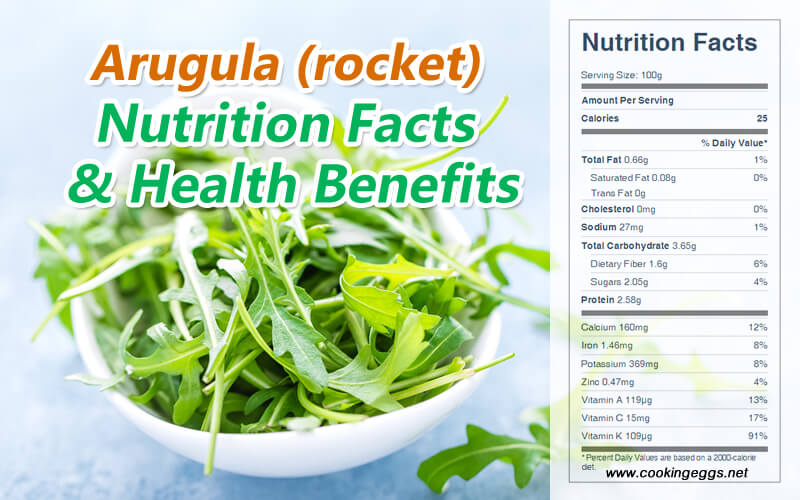Arugula (rocket) Nutrition Facts & Health Benefits
Arugula is also known as rocket, roquette, Italian cress, and roka. Eruca vesicaria is widely popular as a salad vegetable native to the Mediterranean region.
The Nutritional Value of Arugula (Eruca vesicaria)
Arugula contains 91% water, 3.6% carbohydrates, 2.5% protein, and negligible amounts of fat. Arugula is a source of vitamins A, C, and K, as well as calcium, iron, and magnesium.
In a 100-gram reference amount, raw arugula supplies 25 calories, 3.65 g carbohydrate, 2.58 g protein, 0.66 g fat, 1.6 g dietary fiber, 2370 IU vitamin A, 15 mg vitamin C, 109 µg vitamin K, 97 µg folate, 160 mg calcium, 1.46 mg iron, 369 mg potassium, and 47 mg magnesium.

Raw Arugula Nutrition Facts Label
Health Benefits of Arugula
Arugula has a nice amount of vitamin K. One cup contains almost half the recommended daily allowance. Vitamin K is essential for clotting and is a key player in developing strong bones. Research suggests that deficiency of vitamin K may also weaken bones, potentially contributing to osteoporosis, and may promote calcification of arteries and other soft tissues. Low levels of vitamin K have been linked with lower bone density and an increased risk of hip fracture in women, and that a serving a day of arugula salad significantly reduces this risk.
Arugula is a good source of vitamin A and a amount of the extremely eye-healthy carotenoids, lutein and zeaxanthin. It contains more than 2370 IU of vitamin A, including 1420 µg of beta-carotene and 3560 µg of lutein and zeaxanthin. Current research studies suggest that these compounds possess antioxidant properties, and together with vitamin A, they help protect the retina. It is also essential vitamin for good eyesight. In addition, Vitamin A is important for the immune system because it is needed for the differentiation of cells into the various types of immune cells.
Arugula is high in vitamin C and provides about 15 mg per 100 g. Vitamin C is a powerful water-soluble antioxidant. Ascorbic acid is important in the proper function of the immune system. As an antioxidant, it reacts with compounds like histamines and peroxides to reduce inflammatory symptoms. Its antioxidant property is associated with the reduction of cancer incidence.
Like many others in the cruciferous family, the arugula plant contains glucosinolates. When you chew the plant, the glucosinolates mix with an enzyme (myrosinase) that turns them into other compounds called isothiocyanates, which have documented anticancer properties. Isothiocyanates combat carcinogens by neutralizing them, reducing their poisonous effects, and stimulating the release of other substances that help combat them. Isothiocyanates also inhibit cell proliferation. Studies have shown that they help prevent lung and esophageal cancer and can lower the risk of other cancers, including gastrointestinal cancer.
Arugula contains a substantial amount of folate, with a 100 g serving providing 97 µg, which is 24% of the daily value of this important vitamin. As humans cannot make folate, it is required in the diet, making it an essential nutrient. Folate is required for the body to make DNA and RNA and metabolise amino acids necessary for cell division. Inadequate folate intake may increase the risk of certain types of chronic diseases, such as anemia, neural tube defects, CVD, neurological disorders, and CRC.
In addition, arugula contains a variety of minerals like calcium, iron, magnesium, and potassium. They are very necessary for our health and help our bodies work well. Because iron is essential for red blood cells, controlling iron levels in the body is a critically important part of many aspects of human health and disease. Calcium is the most abundant mineral in the body. Its function is in maintaining bone and tooth health, but it is also critical to cell signaling, blood clotting, muscle contraction, and nerve function. Magnesium plays a role in the stability of all polyphosphate compounds in the cells, including those associated with the synthesis of DNA and RNA.